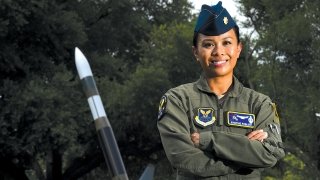Relentless and passionate advocate are words that superiors have used to describe Air Force Maj. Kristine Poblete EdD ’17. One such superior was four-star Gen. Timothy Ray, former commander of the U.S. Air Force Global Strike Command (AFGSC) at Barksdale Air Force Base, Louisiana, the elite organization responsible for two legs of the nuclear triad and strategic deterrence support. As legislative liaison, Poblete coordinated the general’s interactions with Congress, including his “Nuclear Force Posture statement” before the Senate Armed Services Subcommittee on Strategic Forces.
The high praise came along with the Air Force Diversity and Inclusion Recognition Program award, conferred in 2019 for Poblete’s “innovative ideas or concepts in diversity and inclusion.” She had directed AFGSC’s Women’s Leadership Symposium, featuring female leaders, including generals. Its success led to a conference series at other Air Force commands.
Today, Poblete is in demand. This spring, while juggling duties at the Secretary of the Air Force Public Affairs office, she moderated panels on diversity, inclusion and intersectionality at the Department of the Air Force Women’s Air and Space Power Symposium and was a panelist in this spring’s USC Women’s Conference “Women and Power Dynamics in the Workplace” session.
Diversity, equity and inclusion issues—particularly the professional experiences of women in the military—have been a career-long focus. Today, just 19 percent of the officer ranks are represented by women, according to data from the Council on Foreign Relations.
“Particularly in male-dominated fields,” Poblete reflects, “your actions are so magnified. You feel like you have to hide your true self … make yourself a little more palatable and prove your value. You’re essentially representing the entire female population just by being there, [yet] you know you’re worth a seat at the table. You can’t have innovation without inclusivity, and leaders have to create that.”
Poblete’s awareness of these challenges began in high school Air Force Junior ROTC, with the example of one very strong, supportive leader. Retired Chief Master Sgt. Gayle Wesolowski was the sole female instructor. “I identified with her because we had similar personalities—quiet, reserved, observant, introverted,” Poblete says. “She was extremely intelligent, very insightful, caring. She was one of the first women to break through and make it to her rank. It was pretty astounding at the time, being a senior enlisted woman. Her example was that I could be myself and a good leader. I saw what I could become.”
Wesolowski’s example and those early experiences had set the stage for Poblete’s academic and professional achievements. At Washington State University, she was ROTC vice wing commander, which provided scholarship support while she completed her bachelor’s degree in communication.
She went on to earn a master’s in leadership studies from Duquesne University and eventually her EdD from USC Rossier—both while on full-time active duty, through several relocations and raising two kids.
Along the way, Poblete learned that she enjoyed leading a team and was good at it. Using her voice and seeking platforms to make a difference became passions. Her first assignment after her commission nearly killed that passion, but another strong woman leader changed her mind and the course of her career.
Poblete was a missile and operations officer in an intercontinental ballistic missile (ICBM) launch-control center, working mostly in underground bunkers—on duty in case a missile strike was launched. She experienced misogyny and lack of support, and she planned to quit when her service obligation was complete. Her female supervisor saw she was struggling, but also saw who Poblete was—and what she could become. She offered the young lieutenant a post that would appeal to her strengths and interests and allow her to learn in an appreciative environment.
That job—operations support squadron instructor, which required her to train and lead others—proved pivotal, boosting Poblete’s confidence and career prospects. It led to her selection as missile systems flight commander and assistant director of operations for Vandenberg Air Force Base’s ICBM flight-test squadron in California and then to the job at AFGSC.
Motivated to study leadership further while at Vandenberg and Barksdale, Poblete chose USC Rossier’s Organizational Change and Leadership online program. “I was inspired by my cohort,” she says. “I felt extreme impostor syndrome due to my limited experience in education. [My peers] were working with underserved communities, [some] in law enforcement. … But they always made me feel my perspective was valued.”
Professor of Clinical Education and Engineering Anthony Maddox also inspired her. “His compassion toward his advisees and interest in me as a student in the military were crucial,” Poblete says. Maddox saw the importance of her research and gave her confidence to pursue it. Her dissertation was titled “Knowledge, Motivation, and Organization Influences on Persisting Leadership Demographics in a Military Organization: Perspectives on Diversity and Inclusion from Minority Female Officers.” She brought her family to Commencement. Poblete’s family roots span education and the military.
Before they immigrated to the U.S. in the 1970s, her parents were educators in the Philippines. Her father came to join the Army, while her mom continued in education. Kristine was born at the now-deactivated Fort Ord, California, before the family was posted to Fort Lewis, Washington. “My mother had been a guidance counselor for the University of Santo Tomas, Philippines, and my father taught for a private school,” she says, “so I grew up seeing their educational leadership and care for their students. In hindsight, I feel like that had a lot to do with what I ended up pursuing at USC.”
Poblete’s wins have only multiplied. She was named Nuclear and Missile Operations Field Grade Officer of the Year, was given the Brig. Gen. Wilma Vaught Visionary Leadership Award and has excelled in roles at the Pentagon.
“I wanted to broaden my professional expertise and was selected to work in strategic communications for the Secretary of the Air Force Public Affairs Office,” she says. “That gave me the opportunity to work on strategic planning, identify key engagements for senior leaders and identify the messages they wanted to [get out] about their priorities. I got a broader, big-picture understanding of what we’re doing within the Air Force—modernization, strategic competition.”
Then, in June, she was selected as an executive officer for the director of staff for Air Force headquarters at the Pentagon. She is about to be promoted to lieutenant colonel. Poblete credits USC Rossier and her role models—Wesolowski died in 2007, but the supervisor (now base wing commander) who “saved” her career back at the ICBM bunker continued as a mentor—for giving her the “cred” to lead discussions about women navigating power structures. “I’ve been fortunate to work with a few very self-assured, intelligent and strong women,” she says. “The scrutiny is so intense. They always came prepared. They helped me [develop] the mantra that my work speaks for itself. It’s better to be respected for your ideas and intellect than for trying to assimilate. I’ve seen women claw and climb in the most difficult circumstances but move forward despite it all. I’m here because of their example, and I’ll continue to move forward.”





